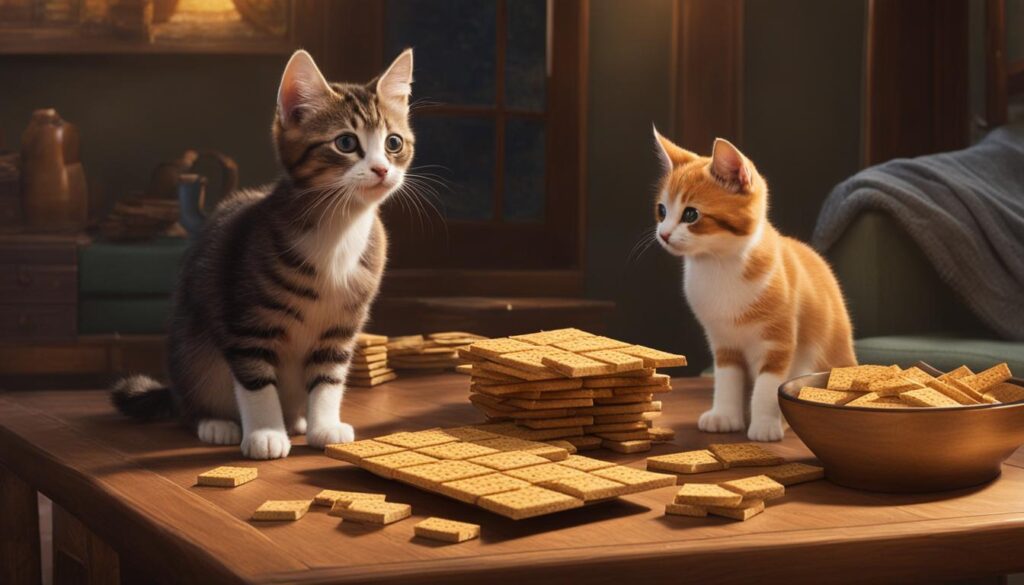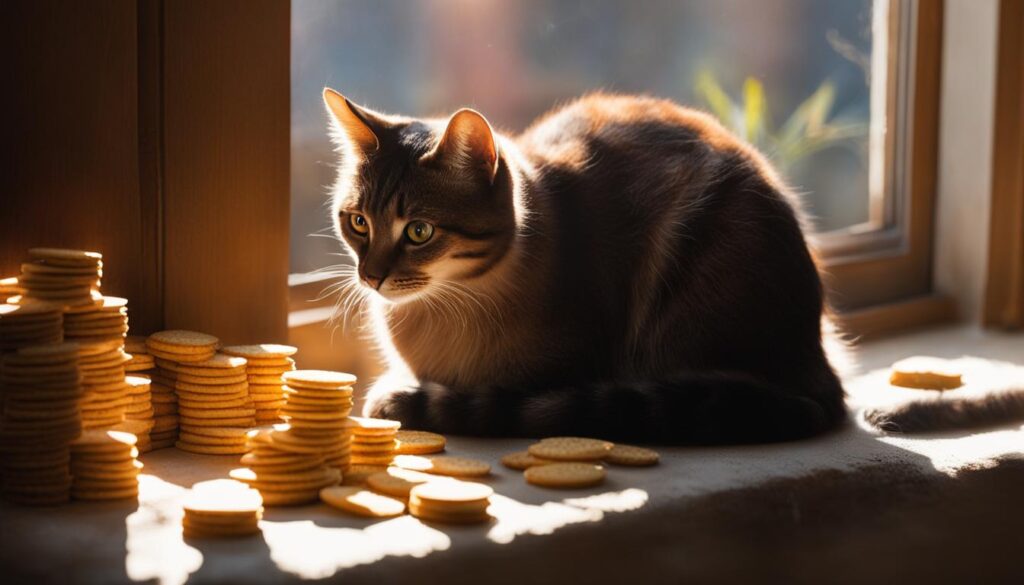Can Cats Eat Crackers? Safe Snacking Guide
Are you wondering if your feline friend can enjoy some crackers as a treat? While it may seem tempting to share your snack with your furry companion, it’s important to consider their health and safety. In this guide, we will explore whether cats can eat crackers, the potential risks associated with feeding them to cats, and alternative snack options that are safer and healthier for our feline friends.
What Are Crackers Made Of?
When it comes to understanding the composition of crackers, it’s essential to know what goes into their creation. Crackers are typically made from baking flour and may contain additional ingredients such as yeast, salt, herbs, and additives that give them a cheese scent. While humans enjoy these crispy treats, it’s important to consider their potential impact on our feline friends.
Cats have unique dietary requirements, and indulging them with crackers may not be the best idea. The high carbohydrate and salt content in crackers can lead to stomach discomfort and intestinal problems for cats. Furthermore, certain substances used in preparing crackers, such as garlic powder and onions, can be toxic to cats and may cause serious health complications.
As responsible pet owners, it is crucial to prioritize our cats’ well-being and ensure their diet consists of cat-friendly options that support their nutritional needs. While it may be tempting to share our favorite snacks with our furry companions, it is essential to choose treats that are safe and suitable for their dietary requirements.
Let’s take a closer look at the potential nutritional benefits of crackers for cats in the next section.
Any Nutritional Benefits?
When it comes to the nutritional benefits of crackers for cats, it’s important to note that most crackers do not offer any useful vitamins or mineral salts for our feline friends. While there may be different types of crackers with varying nutritional content, they are generally not a significant source of nutrients for cats. Instead, cats can obtain their essential nutrients from a balanced and complete cat food that is specifically formulated to meet their dietary needs.
However, if you’re looking for healthier and more nutritious snack options for your cat, there are alternatives to consider. Offering small pieces of baked chicken, turkey, beef, or pork can be a great way to provide your cat with a delicious and nutritious treat. These protein sources can offer important nutrients such as essential amino acids that cats require in their diet. Just be sure to remove any seasonings or spices that may be harmful to cats.
Remember, while it’s tempting to share our favorite snacks with our furry companions, it’s essential to prioritize their health and well-being. Cats have specific dietary requirements, and it’s important to provide them with a balanced diet that fulfills their nutritional needs. If you’re unsure about what treats are suitable for your cat, consult with your veterinarian for personalized recommendations.

“Cats can obtain their essential nutrients from a balanced and complete cat food that is specifically formulated to meet their dietary needs.”
When to Feed Your Cat with Crackers
Feeding cats crackers can be an occasional treat but should not be a regular part of their diet. While plain crackers are not toxic to cats, it is important to exercise caution and moderation when giving them as treats to your feline friends.
If you do decide to offer your cat a small portion of plain crackers, make sure to check the ingredients. Some spices or Allium family ingredients like garlic or onions can be harmful to cats and should be avoided. Always read the packaging and ensure that the crackers do not contain any potentially toxic substances.
Start by offering a tiny portion of crackers to your cat and observe how they respond. If they show any signs of discomfort or digestive issues, discontinue feeding them crackers immediately. Every cat’s tolerance and reaction to crackers may vary, so it’s crucial to pay attention to your cat’s individual needs and preferences.
Breaking the Crackers into Smaller Pieces
When feeding your cat crackers, it is essential to break them into smaller, bite-sized pieces. This helps prevent choking hazards and makes it easier for your cat to eat and digest the crackers. Cats have different mouth structures and chewing abilities compared to humans, so providing smaller pieces is necessary for their safety and comfort.
“Feeding cats crackers should be a very occasional treat and not a regular part of their diet.”
Alternatives to Crackers as Cat Treats
While crackers may seem like a convenient snack option, there are healthier alternatives that you can consider for your cat. Instead of crackers, opt for cat-specific treats that are specifically formulated to meet their nutritional needs. These treats are designed to provide balanced nutrition and are generally safer for your cat’s overall health.
If you prefer offering natural treats, consider small pieces of baked meat like chicken, turkey, beef, or pork. These protein-rich options can be a healthier and more nutritious alternative to crackers. Always ensure that any additional foods given to your cat do not exceed 10% of their daily calorie intake to maintain a balanced diet.
A Note of Caution
While cats may enjoy the occasional plain cracker as a treat, it is important to note that excessive consumption can lead to potential health issues. Feeding cats large quantities of crackers can result in salt poisoning, dehydration, and digestive problems. Cats have unique digestive systems, and they may not be able to effectively break down certain substances found in crackers.
If you notice any signs of overconsumption such as vomiting, diarrhea, nausea, or a lack of appetite, it is important to consult with a veterinarian. They can provide guidance, assess your cat’s health, and offer advice on suitable diet choices for your furry companion.
| Pros of Feeding Cats Crackers: | Cons of Feeding Cats Crackers: |
|---|---|
|
|

Possible Side Effects of Giving Your Cat Crackers
While small amounts of crackers may not have immediate toxic effects on cats, it’s essential to be aware of the potential side effects that can occur with excessive consumption. Feeding cats an excessive amount of crackers can lead to various health issues, including:
- Salt poisoning: Cats have lower tolerance levels to salt compared to humans. Consuming large amounts of crackers, which are typically high in salt, can lead to salt poisoning in cats. Symptoms of salt poisoning may include increased thirst, excessive urination, diarrhea, lethargy, and in severe cases, seizures.
- Dehydration: The high salt content in crackers can cause cats to become dehydrated. Excessive salt intake can lead to increased water loss through urination, resulting in dehydration. Dehydration can be detrimental to a cat’s overall health and well-being and may lead to organ dysfunction if left untreated.
- Digestive problems: Cats have unique digestive systems that differ from humans. They may not be able to effectively break down certain substances found in crackers, such as gluten or additives. These undigested components can cause digestive issues in cats, including stomach discomfort, diarrhea, vomiting, and lack of appetite.
- Other symptoms: Overconsumption of crackers can manifest in various symptoms in cats. These may include nausea, abdominal pain, gastric upset, and a general feeling of unwellness.
It is crucial to monitor your cat’s behavior and health after giving them crackers. Keep a close eye for any signs of distress or discomfort, especially if your cat has consumed a significant amount of crackers. If you notice any of the mentioned symptoms or suspect your cat may have overindulged in crackers, it is advisable to consult with a veterinarian for appropriate guidance and treatment.
“Excessive salt intake can lead to increased water loss through urination, resulting in dehydration.”
| Side Effects | Symptoms |
|---|---|
| Salt poisoning | Increased thirst, excessive urination, diarrhea, lethargy, seizures |
| Dehydration | Increased water loss, decreased urination, dry mouth, lethargy |
| Digestive problems | Stomach discomfort, diarrhea, vomiting, lack of appetite |
| Other symptoms | Nausea, abdominal pain, gastric upset, general feeling of unwellness |
Conclusion
In conclusion, while plain crackers are not toxic to cats, they are not considered a healthy or nutritious treat for our feline friends. Cats have specific dietary needs that are best met through a balanced and complete cat food. Feeding them excessive amounts of crackers can lead to potential health issues such as salt poisoning, dehydration, and digestive problems.
If you do choose to offer your cat an occasional treat, it is important to opt for safer alternatives like small pieces of baked meat. These can provide a healthier option with more nutritional value for your furry companion. Remember to always consult with a veterinarian before introducing any new foods into your cat’s diet to ensure their safety and well-being.
While it may be tempting to share your favorite snacks with your cat, it’s important to prioritize their health and choose cat-friendly options. By understanding their nutritional needs and making informed choices, you can ensure that your beloved feline companion stays happy and healthy for years to come. Remember, it’s always better to be safe than sorry when it comes to the well-being of our furry friends!
FAQ
Can cats eat crackers?
Crackers are not considered a healthy treat for cats due to their high salt and carbohydrate content. While plain crackers are not toxic to cats, they can pose health issues such as stomach discomfort and intestinal problems. It is best to avoid feeding crackers to cats and opt for healthier treats.
What ingredients are typically in crackers?
Crackers are typically made from baking flour and may contain yeast, salt, herbs, and additives that give them a cheese scent. The high amount of carbohydrates and salt in crackers can cause stomach discomfort and intestinal problems for cats. Additionally, some substances used in preparing crackers, such as garlic powder and onions, can be toxic to cats.
Do crackers have any nutritional benefits for cats?
While there may be different types of crackers with varying nutritional content, most crackers do not provide any useful vitamins or mineral salts for cats. Cats can benefit from a balanced and complete cat food that meets their nutritional needs. Offering small pieces of baked chicken, turkey, beef, or pork can be a healthier and more nutritious snack option for cats. It is important to ensure that any additional foods given to cats do not exceed 10% of their daily calorie intake.
When should I feed my cat crackers?
Feeding cats crackers should be a very occasional treat and not a regular part of their diet. If you do decide to give your cat a small portion of plain crackers, it is important to check the ingredients for any spices or Allium family ingredients like garlic or onions, as these can be harmful to cats. Start with a tiny portion and monitor how your cat responds. Be sure to break the crackers into smaller pieces to avoid choking hazards.
What are the possible side effects of giving my cat crackers?
While small amounts of crackers may not have immediate toxic effects on cats, excessive consumption can lead to salt poisoning, dehydration, and digestive problems. Cats have different digestive systems than humans and may not be able to effectively break down certain substances found in crackers. Symptoms of overconsumption may include vomiting, diarrhea, nausea, and lack of appetite. It is best to avoid feeding cats excessive amounts of crackers to prevent potential health issues.
Is it safe for cats to eat crackers?
In conclusion, while plain crackers are not toxic to cats, they are not considered a healthy or nutritious treat. Cats can benefit from a balanced and complete cat food that meet their nutritional needs. If you choose to offer your cat an occasional treat, it is important to opt for healthier options like small pieces of baked meat. Avoid feeding cats excessive amounts of crackers and always consult with a veterinarian before introducing any new foods to your cat’s diet.

